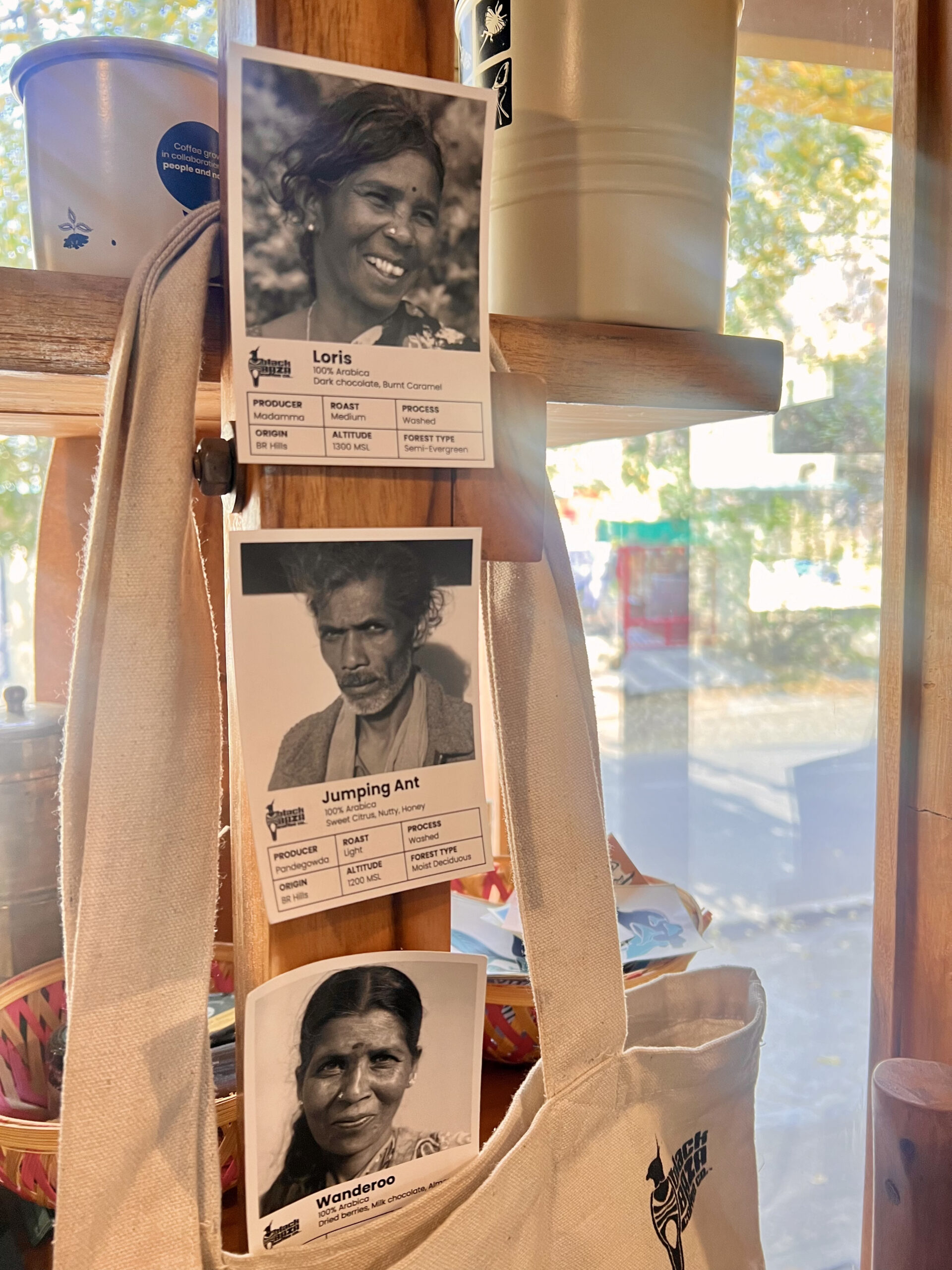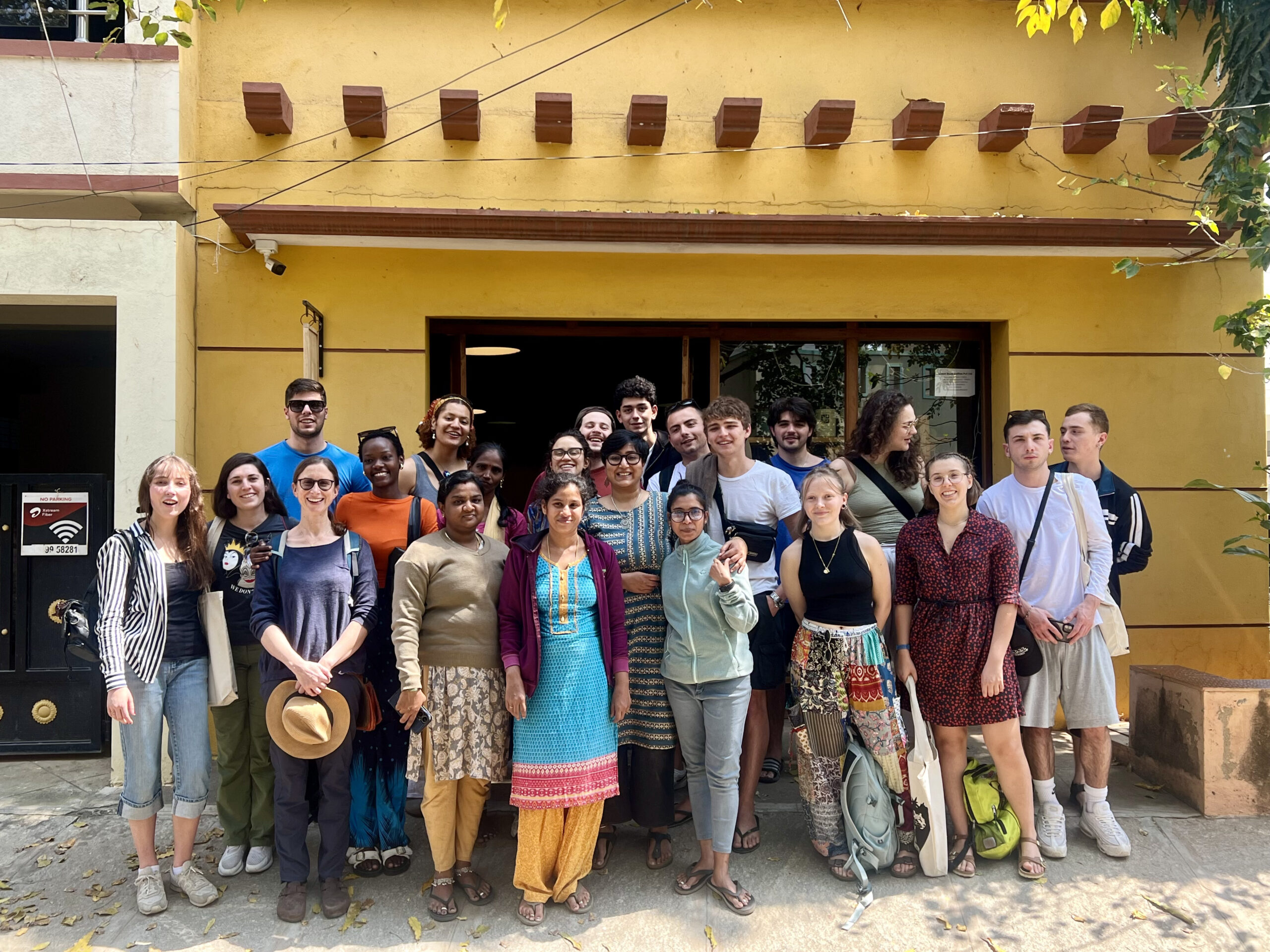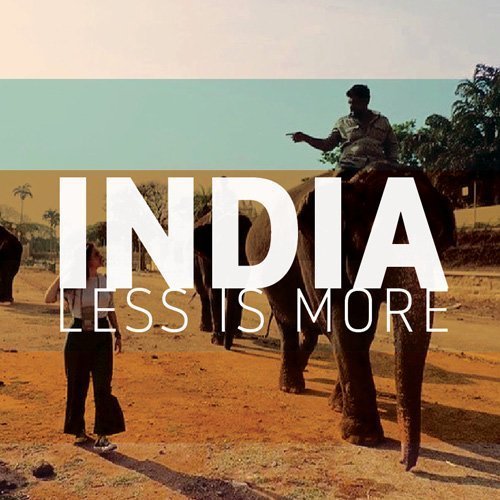Arshiya Bose spent ten years researching the coffee plantations in the Western Ghats before launching a specialty roastery in Bangalore. Now, she collaborates with 394 smallholders, integrating agroforestry techniques to safeguard biodiversity and wildlife while preserving one of the world’s top eight environmental hotspots.
The Black Baza is a small, elusive bird that moves through the forests of India, almost like a shadow, playing a role in the delicate balance of its ecosystem. It is also the name that Arshiya Bose chose for her coffee roastery. This is no coincidence—she knows that in an industry where speed seems to be the only way to survive, her project will always stand on the opposite side: protecting the forest, Indigenous communities, and wildlife, with no interference but a subtle whistle to serve as a guide, just like the local bird that inspired the brand’s name.
The project was born even before Dr. Arshiya Bose realized it. First, she graduated in biology in the United States, followed by studies in philosophy, geography, and environmental science in the United Kingdom. Then, she began researching the relationship between nature and farmers. “When I started my PhD research in 2009, I thought I wanted to study snow leopards, but then I switched geographies and dedicated a decade dipped and drenched in coffee” recounts Arshiya about her unexpected beginning in the coffee world.
It all started in the Western Ghats, a mountain range also known as the Sahyadri, which stretches 1,600 km along the western coast of the Indian peninsula. There, she discovered one of the world’s hottest biodiversity hotspots, home to India’s largest population of Asian elephants, as well as tigers, leopards, about 50% of India’s amphibians, and several endemic primates like the lion-tailed macaque and the Nilgiri langur. But the richness was not only in nature—the mountains also housed numerous indigenous communities who worked in coffee plantations and who, over time, shared with Arshiya their ancestral knowledge of nature conservation, fostering a reciprocal exchange of wisdom and care. For ten years, she listened intently to these people, to the singing sounds of nature, and to coffee scholars before opening her own space, becoming, since the beginning, a true example of a Slow Coffee project, one that embraces the concepts of ‘Good, Clean and Fair’ fully. She dedicated herself to coffee and its entire supply chain, learning over the years how to positively impact the ecosystem and the people living within. She dedicated herself to coffee and its entire supply chain, learning over the years how to positively impact the ecosystem and the people living within.
During her journey, she began working with local cooperatives that were already growing coffee, but without a holistic approach. Arshiya remembers the beginning: “In 2014, we began with some practices such as restoring native tree species, restricting shade regulation, stopping the spraying of chemical inputs, and watching out for a stream on a farm where we had spotted small-clawed otters.” Then, in 2016, they set up their manufacturing unit in Bangalore to distribute quality coffee from producers committed to making a positive environmental impact. Four years later, their first coffee roaster arrived, and from that point on, they began to fill their business with the aroma of freshly roasted coffee.
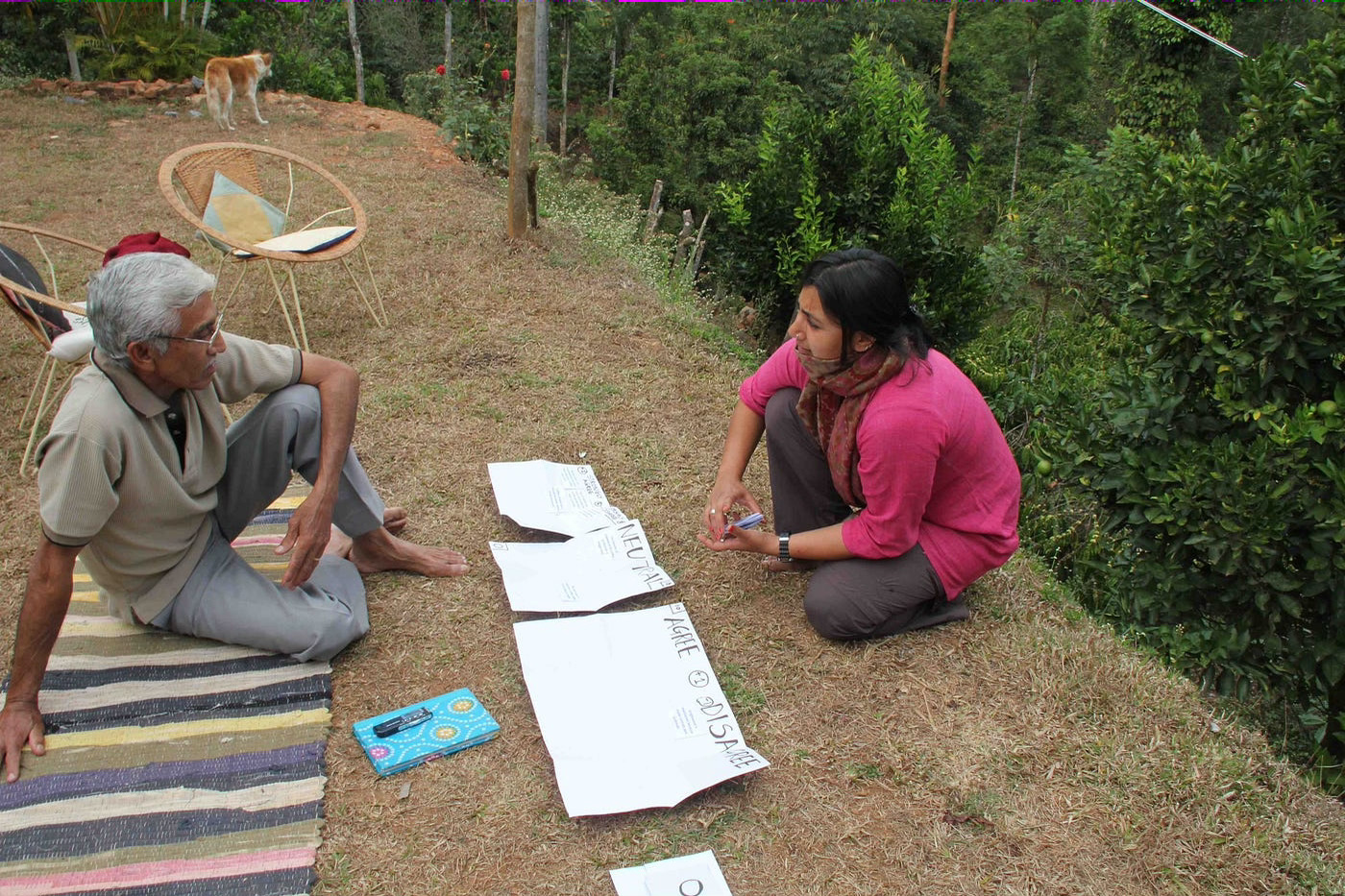
One of Black Baza Coffee’s main goals is to restore what has been damaged and protect what could easily and quickly be destroyed—resisting extractive systems, monoculture farming, and the notion that coffee must come at the cost of nature. Their mission is simple yet radical: to prove that coffee can be grown harmoniously with forests and the communities that have lived among them for generations. Instead of cutting down trees, they plant them. Instead of squeezing smallholder farmers for profit, they pay them fairly—30% above market prices. Instead of treating coffee as just another commodity, they see it as an opportunity to connect growers, the land that nurtures it, and those who drink it. Their environmental approach is rooted in agroforestry, shade coffee, and pesticide-free, chemical-free crops. Agroforestry refers to the intentional combination of trees with crops and animals to protect plants and their microorganisms, maintaining soil fertility and moisture. This practice is crucial for capturing carbon dioxide, mitigating climate change, improving wildlife habitats, boosting agricultural economies, and enhancing the beauty of the landscape. Among Black Baza’s partner farms, coffee trees grow alongside pepper, cardamom, and cocoa, while elephants, leopards, flying dragons, and lion-tailed macaques roam freely among the crops. Shade coffee, on the other hand, uses the protective canopy of trees to shield the soil from direct sunlight, preventing excessive evaporation that could dry out the soil and deplete its nutrients. Additionally, all Black Baza farmers commit to growing coffee without chemical pesticides and fertilizers, ensuring a healthier environment for both people and wildlife that depend on coffee farms for habitat.
Another challenge for this project is introducing coffee into a society historically accustomed to tea. However, as world coffee expert James Hoffmann explains in his book “The World Atlas of Coffee,” India’s vast population means that even with an annual per capita coffee consumption of just 100g, total national consumption still reaches two million bags per year. While most of India’s coffee is Robusta, Black Baza Coffee focuses primarily on Arabica, which offers a smoother, more refined, and aromatic flavor profile. Their sourcing regions include Tamil Nadu—the southernmost of India’s 28 states, with elevations ranging from 600m to 2,000m — Karnataka—the leading coffee-producing state, with altitudes between 700m and 1,500m—and Kerala—which accounts for nearly one-third of India’s total coffee production, growing at altitudes from 400m to 1,600m.
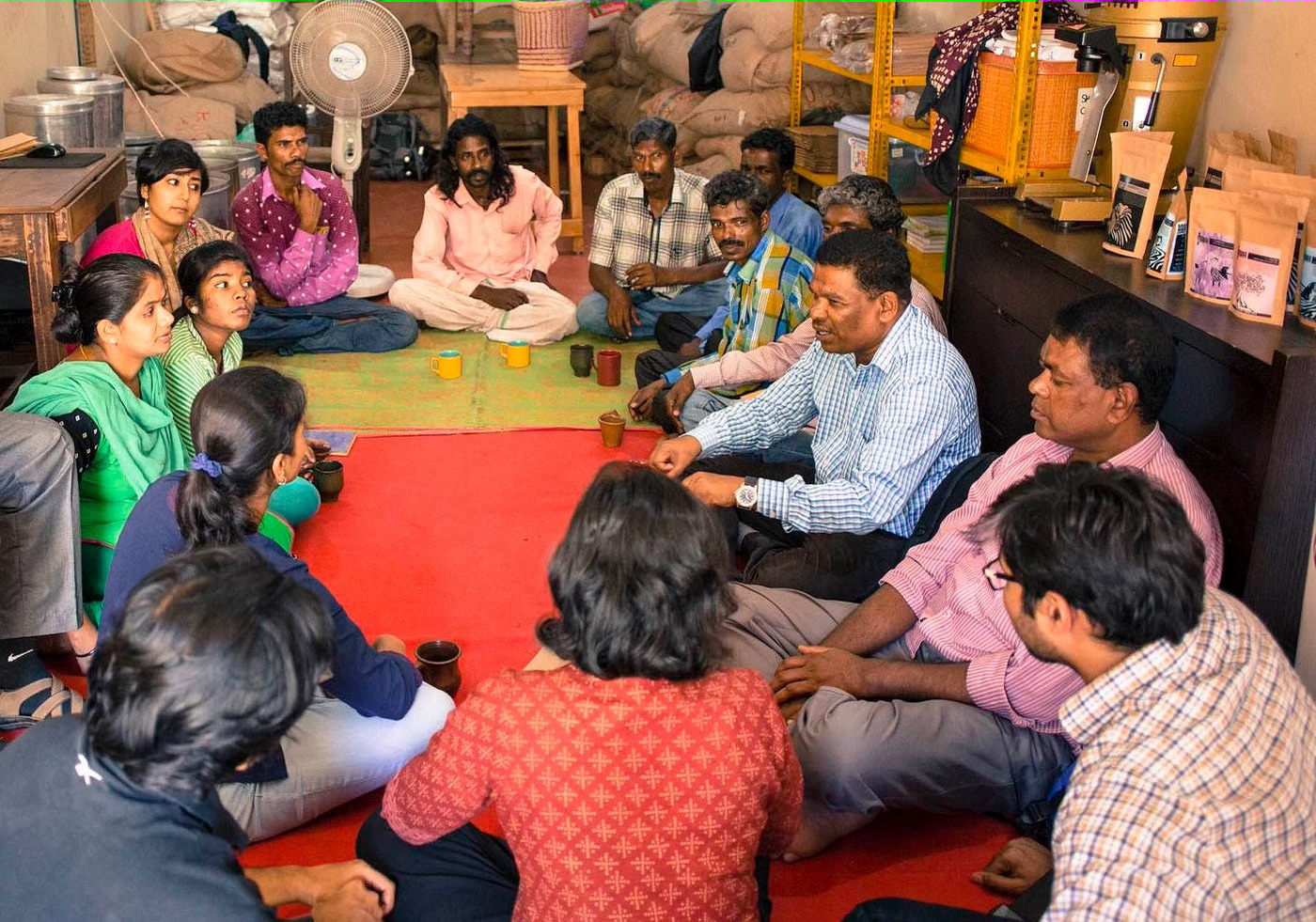
Black Baza’s coffee selection changes annually, but they strive to offer at least 15 varieties at all times. In general, 75% of their production is pure Arabica, 15% is an Arabica-Robusta blend, 10% is pure Robusta, and they also offer a unique blend of Arabica, Robusta, and Chicory. Their 250g packages are sold at their Bangalore store and through their website, where customers can find detailed information about each coffee, brewing recommendations, and insights into its origins and production process.
In line with their circular philosophy, Black Baza Coffee also incorporates byproducts that would otherwise be discarded. Under the same brand, they offer Cascara—the dried coffee cherry husk used for infusions—Biligiri Black Pepper—a spicy, fruity pepper from the forests of BR Hills, Karnataka—Attihalli Cardamom—a sweet, herbaceous spice from Sakleshpur, Karnataka—and Coffee Flour—made from dried coffee fruit husks, a nutrient-rich, gluten-free flour. In the case of this last one, without repurposing, millions of tons of coffee husks would end up in landfills, contributing to methane gas emissions. Their packaging is also fully biodegradable: the outer paper bag is made from waste sugarcane pulp, a byproduct of the sugar industry, while the inner bag is a biodegradable polymer that decomposes naturally within 8 to 24 months, leaving no harmful residues. Each package features an illustration of one of the insects or wild animals that inhabit the coffee farms, raising awareness of the importance of preserving their habitat.
While Arshiya’s project was taking shape, one question remained at its core: How can we produce coffee without negatively impacting wildlife while working with local communities? The answer lies in the renewed trust in smallholders, grassroots action to improve their livelihoods, scientific research, and a business model that brings high-quality, positive-impact coffee to people. In a world where coffee is often reduced to a mass-produced product designed to provide a quick caffeine fix—without faces, without stories, and without responsibility—Black Baza Coffee challenges the status quo. Lastly, it is important to remember that, as consumers, we have the power to support such initiatives and reshape the industry, proving that coffee can be more than a morning ritual—it can be a catalyst for environmental and social regeneration.
